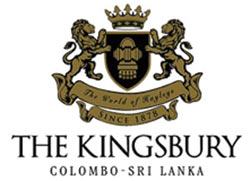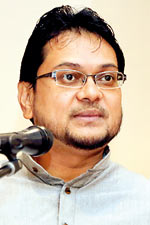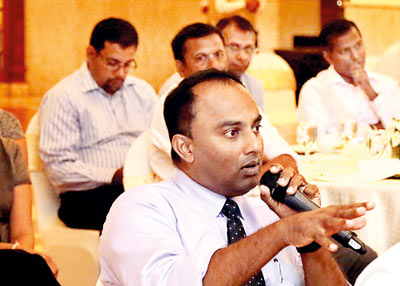Need for consensus decision-making between the President and the PM
 Will the Right to Information Bill (RIT) presented in parliament last month change the culture of the public service and the course of the people in future? This was a question raised by Executive Director of Verite Research Dr. Nishan de Mel addressing the Sunday Times Business Club (STBC) meeting at the Kingsbury Hotel in Colombo last week on issues dealing with new policies and its impact on society. Business associations are weak and act as lobby groups as they think this is what their role should be, he said adding that they are weak.
Will the Right to Information Bill (RIT) presented in parliament last month change the culture of the public service and the course of the people in future? This was a question raised by Executive Director of Verite Research Dr. Nishan de Mel addressing the Sunday Times Business Club (STBC) meeting at the Kingsbury Hotel in Colombo last week on issues dealing with new policies and its impact on society. Business associations are weak and act as lobby groups as they think this is what their role should be, he said adding that they are weak.
For example every single business leader in the private sector would praise the budget proposals in public but criticise it privately. He said many businessmen preferred back door negotiations with politicians and with bureaucrats privately to strike business deals rather than formulate a broad based policy on businesses that profit the business community as whole. Dr. de Mel said bureaucrats also dealt with the private sector with the carrot and stick policy so long as they did not show hostility to state policies.
 “The private sector was known as lobbying groups and businessmen knew that to make profit was through back door negotiations.” He said it was worthwhile looking into the policy changes that took place following the election of the new government implications for doing business in Sri Lanka in the new policy context. Institutions are more important than individuals and changing them (or improving efficiencies) matter much more than changing people. Dr. De Mel said that when the government changed in January 2015, the changes it made to new policy and implications for doing business in Sri Lanka is worthwhile looking at.
“The private sector was known as lobbying groups and businessmen knew that to make profit was through back door negotiations.” He said it was worthwhile looking into the policy changes that took place following the election of the new government implications for doing business in Sri Lanka in the new policy context. Institutions are more important than individuals and changing them (or improving efficiencies) matter much more than changing people. Dr. De Mel said that when the government changed in January 2015, the changes it made to new policy and implications for doing business in Sri Lanka is worthwhile looking at.
“Who has the authority and executive power to make policy in the country? We know according to traditional thinking it was the President who makes policy and decision making of the country. The

Nishan De Mel
President has the power to appoint members of parliament and form the cabinet. However in Sri Lanka, the executive and the legislature tends to merge. The 19th Amendment made significant changes to the executive powers of the President who appoints cabinet members on the recommendation of the Prime Minister.
However the 19th amendment also empowers the President to reject cabinet members recommended by the Prime Minister without consulting him. Therefore the President and the Prime Minister has to come to some agreement when forming a cabinet and forming policies that would otherwise become unstable. He said there is a need for some mechanism to bring a consensus between the President and the Prime Minister with regard to policy decisions.
Responding to questions posed to him by the STBC members that institutions become paralysed when a new government assumes office, Dr. De Mel said that the President appoints Secretaries to ministries but there seem to be vested interest among these officials when they execute public policy. “It is so perverse that changing people will change the situation. We have to make the public sector accountable for their action. They must share information in what they do.” The RTI has the potential to change the culture of the public service like what is happening in India now.

Question from the audience


